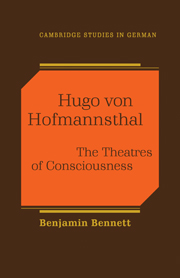Book contents
- Frontmatter
- Contents
- Preface
- Acknowledgments
- List of Abbreviations
- Part I Principles of lyric and drama
- Part II Language and society
- Part III Culture and collapse
- 13 Art by accident
- 14 The allomatic
- 15 The rôle of “Vorwitz” in Das Salzburger Groβe Welttheater
- 16 Salzburg as a theater
- 17 Goethe, Nietzsche, Thomas Taylor and Der Turm
- 18 A tower in ruins: the tragedy of a tragedy
- Conclusion
- Notes
- Index of works
- General index
15 - The rôle of “Vorwitz” in Das Salzburger Groβe Welttheater
Published online by Cambridge University Press: 04 August 2010
- Frontmatter
- Contents
- Preface
- Acknowledgments
- List of Abbreviations
- Part I Principles of lyric and drama
- Part II Language and society
- Part III Culture and collapse
- 13 Art by accident
- 14 The allomatic
- 15 The rôle of “Vorwitz” in Das Salzburger Groβe Welttheater
- 16 Salzburg as a theater
- 17 Goethe, Nietzsche, Thomas Taylor and Der Turm
- 18 A tower in ruins: the tragedy of a tragedy
- Conclusion
- Notes
- Index of works
- General index
Summary
Hofmannsthal's festival plays, and his other activities in connection with Salzburg, represent a development of his concern with the contingent in art. The collaboration with Strauss still results in works, works that reveal on examination their non-existence beyond the limits of performance, but still works, structures, in which even the property of contingency assumes, paradoxically, a necessary place. But once the Salzburg Festival is established as a regular cultural event – provided it is established in the sense Hofmannsthal envisages – the very idea of “work” will cease to be applicable to products like Das Salzburger Groβe Welttheater; the book versions of such plays will be merely the written record of a repeated communal rite that belongs to no “author” but to the culture as a whole, like a service at some point in the church calendar. And if the idea of the work disappears, then perhaps the problem contained in the idea of the allomatic will also disappear. Perhaps the speaking of metaphysical truth will become possible after all, as a speaking of the whole culture to itself, no longer an individual's struggle to communicate.
The question of theatricality therefore becomes critical. I have insisted on the basic theatricality of Hofmannsthal's dramatic and even of his lyrical work, from Der Tor und der Tod on; and I have shown, I think, that the technique of art by accident is a consequence of sound theatrical thought, not an admission of theatrical incompetence.
- Type
- Chapter
- Information
- Hugo von HofmannsthalThe Theaters of Consciousness, pp. 269 - 286Publisher: Cambridge University PressPrint publication year: 1988

